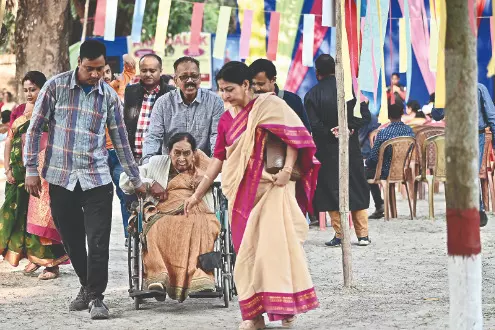Beacon of Hope and Dignity
In Badu, North 24 Parganas, Anandalok redefines care for the specially abled—building dignity, resilience, and hope through community, creativity, and a lifelong promise of compassion

In our relentless pursuit of progress, amidst the clamour of headlines that often amplify division and despair, it is easy to lose sight of the quiet, constructive work that forms the true bedrock of our society. It is this search for the nation’s hidden reserves of strength and compassion that led to the creation of the Nexus of Good—a movement dedicated to discovering, celebrating, and connecting the countless individuals and organisations working tirelessly to build a better India. There is a belief that by shining a light on these “islands of excellence,” a powerful ripple effect of positive change can be inspired.
Recently, at an event organised by the Kolkata Chapter of Nexus of Good, the audience had the profound honour of listening to the story of Anandalok, the Welfare Centre for the Mentally Handicapped. As their journey unfolded, a hush fell over the room. Here was not just a presentation, but a testament to the enduring power of human empathy—a story that deserves to be told far and wide.
Anandalok’s story begins not with grand blueprints, but with a simple, powerful vision. In 1989, four committed individuals—Ashok Sengupta, Bijoy Choudhury, Devika Mallick, and Mala Banerjee—saw a pressing need. They saw families struggling, often in silence, to care for their adult children with intellectual disabilities. They saw the looming question that haunts every ageing parent of a special-needs child: “After us, who?”
Their answer was Anandalok, meaning “A World of Joy.” It began its journey in 1990 in Bhadreshwar and soon found its permanent, sprawling home in Badu, North 24 Parganas, thanks to the extraordinary generosity of the late P.K. Bose, fondly known as Saheb Da, who donated 2.39 acres of serene, green land. With the guidance of its first president, the celebrated late actor Anil Chatterjee, Anandalok laid its foundation not just in brick and mortar, but in the principles of dignity, care, and lifelong support.
What makes Anandalok truly exceptional is its philosophy. It is not merely a residential facility; it is a “home away from home” in the truest sense. It is a place where 36 residents, who for various reasons cannot be supported by their families, are not just housed, but nurtured. The organisation has meticulously crafted a holistic ecosystem designed to help every individual reach their fullest potential, irrespective of their challenges.
A day at Anandalok is a symphony of purposeful activity. The morning might begin with yoga or sports, fostering physical fitness and focus. This is followed by structured learning, where special educators work on functional literacy and cognitive skills, often using computers as an effective teaching aid. The afternoons are alive with creativity. In one corner, residents learn the rhythm of dance; in another, they express their inner worlds through art and music.
Crucially, Anandalok is deeply committed to fostering a sense of self-worth through vocational training. Residents are taught skills like silk-screen printing, candle-making, and crafting paper bags. This is not just about keeping them occupied. It is about the profound dignity that comes from creating something with one’s own hands. When these products are sold at exhibitions, the pride in the residents’ eyes is immeasurable. It is a powerful affirmation of their abilities and a small but significant step towards financial independence.
The institution’s approach to sustainability is equally inspiring. A significant portion of the nutritious meals served comes from their own organic farm, where residents also participate in cultivation. A pond on the premises provides a steady supply of fresh fish. This self-reliant model not only ensures wholesome food but also instils a connection to the earth and the dignity of labour.
However, this journey of compassion is not without its formidable challenges. The operational costs of providing round-the-clock care, personalised medical attention, and specialised educational programs are immense. The facility, which provides subsidised care to residents primarily from middle-class backgrounds, relies heavily on the generosity of donors to bridge the financial gap. Their buildings need completion, their day-care centre for local children needs expansion, and they dream of adding a physiotherapy unit and harnessing solar power to become more self-sufficient.
The need for places like Anandalok is growing. As society changes, the traditional family support systems that once existed are eroding, leaving the most vulnerable at risk. Anandalok stands as a sanctuary, offering not only a safe haven for its residents but also immense relief to families who have dedicated their lives to caregiving.
Anandalok’s story is a powerful reminder that the most significant change often comes from grassroots efforts, fueled by empathy and community support. They are a shining example of what the Nexus of Good stands for—an organisation that has quietly built a world of hope, dignity, and joy. They prove that it is possible to create inclusive spaces where every individual is valued and given the chance to blossom.
As a society, we have a collective responsibility to support such initiatives. They are the conscience-keepers of our communities. There is a need to look beyond the headlines and seek out these stories of quiet determination. To truly understand the heart of Anandalok, one must experience it. As they rightly say, seeing is believing. We need to come together to ensure that this beacon of hope continues to shine brightly for decades to come.
Views expressed are personal. The writer is an author and a former civil servant



